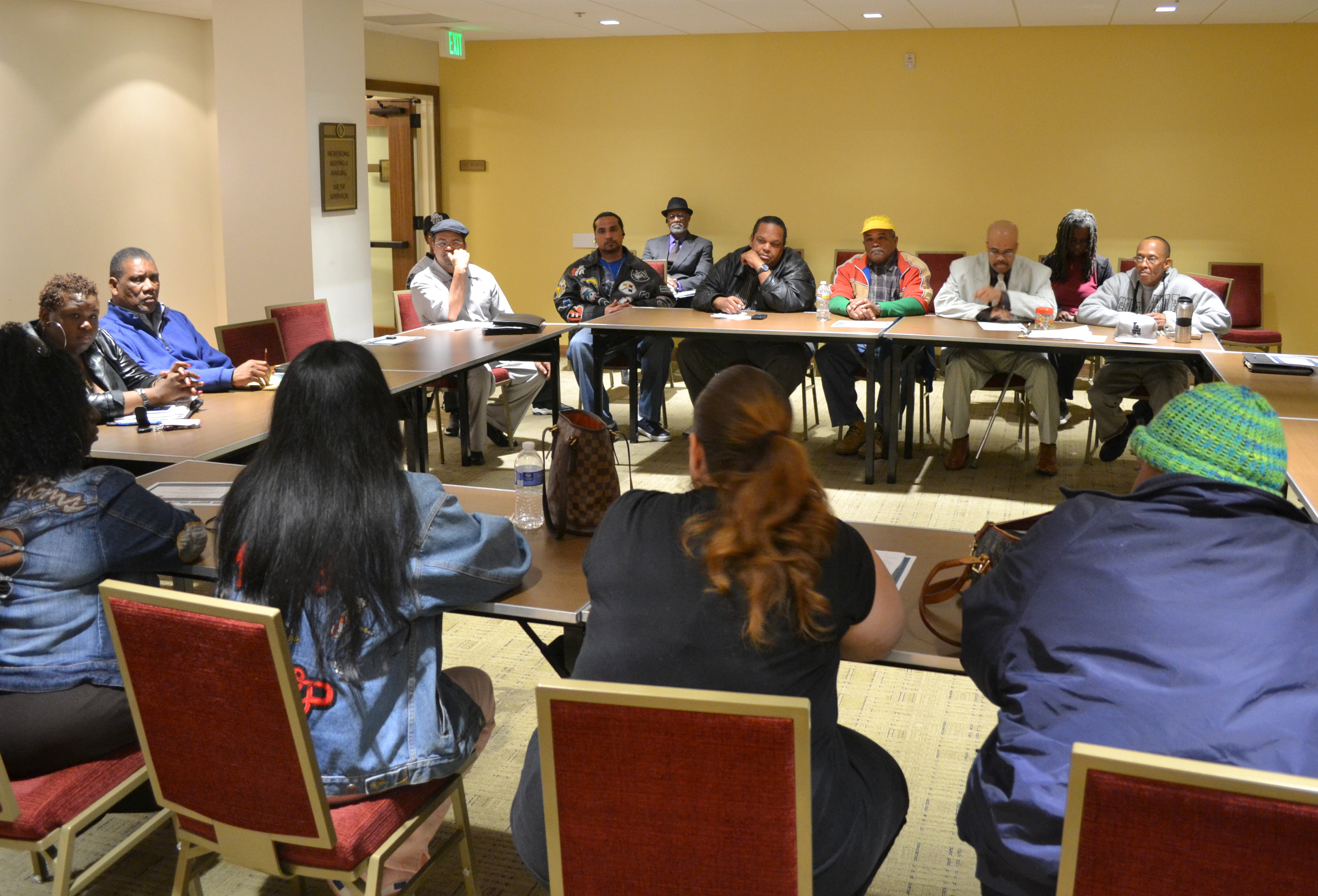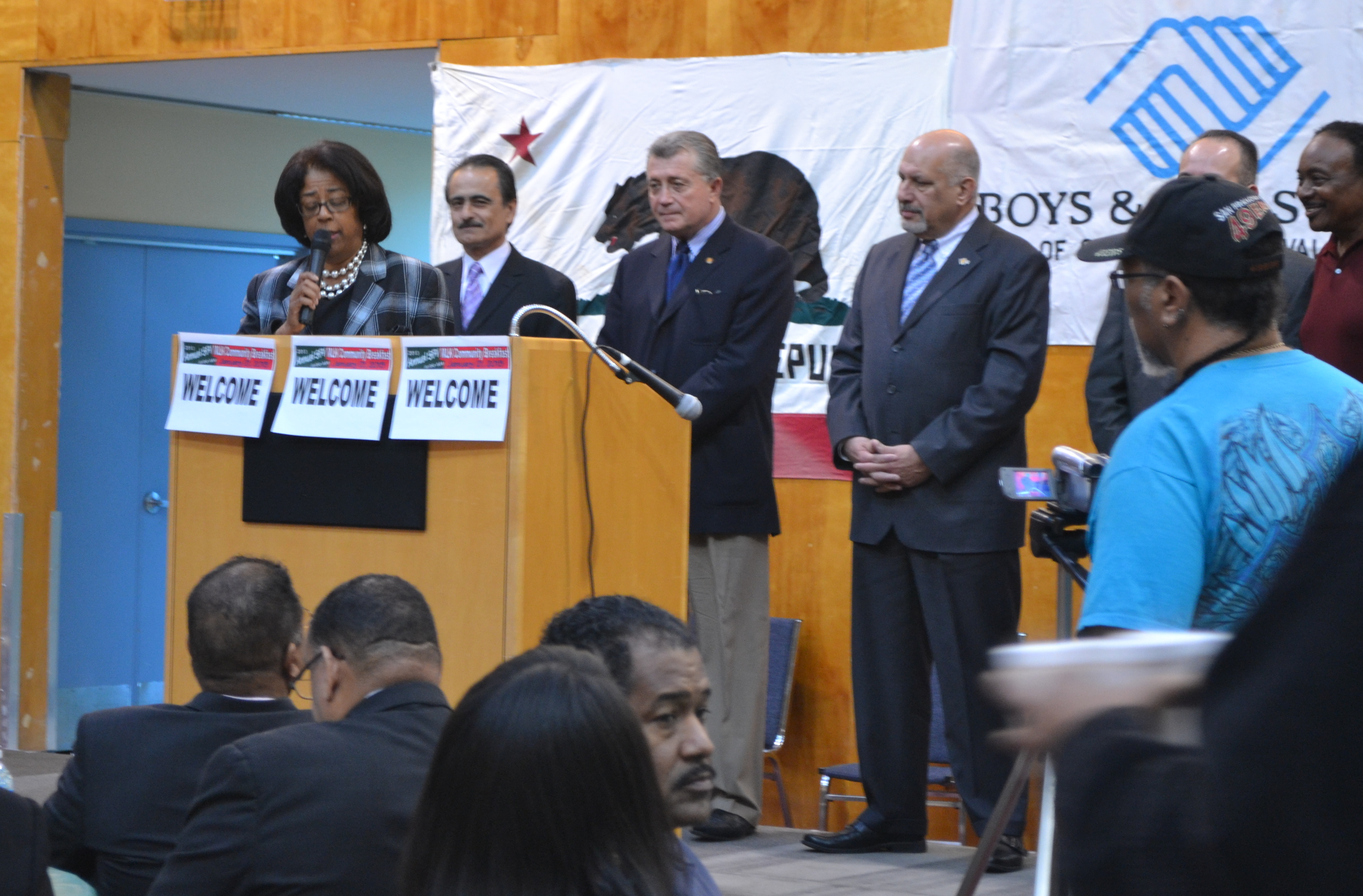Ben “Taco” Owens lifts up the sleeve of his gray, button-up shirt to reveal the full length of the deep scar along his right arm. He was shot twice in 1989 after a gang member asked him what he calls “the most dangerous question in the world,” and a common prelude to gang shootings: “Where are you from?”
Owens is from Los Angeles. And as his scar reminds everyone in the room, he is intimately familiar with gun violence in the city.
“How many people here have been shot?” he asks the attendees of the Southern California Cease Fire Committee’s meeting on gun violence. He and one other man raise their hands.
He rephrases the question, “How many people here have been shot at?” Almost all of the 21 people present raise a hand.
The Southern California Cease Fire Committee, a group that works to reduce gang violence through conflict mediation and community activism, gathered Wednesday evening, just hours after U.S. Senate Judiciary Committee hearings began on gun violence in America. But unlike national politicians, the people assembled in the basement room of a community center on Vermont Avenue and 80th Street are not policy makers. Nor is their meeting anything out of the ordinary. They met on Wednesday—as they have every week for the past eight years—for an open discussion about gun violence.
The people at the meeting, like Owens, have personal, often tragic, histories with guns. Vicky Lindsey, an executive board member of the committee, for example, lost her 19-year-old son to gunfire in 1995.
“He was shot inside the car. They rode around and let him die. He choked on his own blood,” Lindsey said.
Stories like Lindsey’s and Owens’ are what make the communities of South L.A. the most violent in the city. In fact, within about a mile radius of the building where the group meets, the LAPD reported nine homicides in the past year.
Los Angeles—South L.A. included—has witnessed a dramatic decrease in crime in recent years. Last year’s tally of 298 homicides citywide was less than half the number in 2002. 2012 also saw a 10 percent decrease in gang-related crimes from the previous year.
But South L.A. continues to shoulder an unequal share of the violence. With just over 600,000 residents, The LAPD’s South Bureau, which covers South L.A. is the smallest of the department’s four bureaus and accounts for less than 20 percent of the city’s total population. But in 2011, nearly half of homicides in Los Angeles took place in South L.A. The LAPD spends more per capita policing South L.A. than any other part of the city.
“Unless it’s over with, it makes no difference. Unless we’re down to zero homicides it doesn’t matter,” Lindsey said.
The people seated in a circle around folding tables in the meeting go around the room, taking turns to share personal stories and vent frustrations about their community. The meetings, Owens admits, are sometimes just “preaching to the choir.”
Not everyone in attendance agrees on the cause of violence or the best solution for it though. Some gun owners in the room admit to feeling safer with a gun at home to defend their families. One man describes not wanting anyone to find out that his home was the only one in the neighborhood without a gun inside. Another man says the reason he chooses not to keep a gun is because he knows he would be tempted to use it. “I’m a shooter,” he says.
The group touches on religion, race, mental illness, parenting, violent video games, and generational differences—many of the same themes that come up in national discussions of gun control.
Even so, members of the Southern California Cease Fire Committee don’t all feel confident in politicians’ abilities to solve gun violence.
“Whatever decision is made on Capitol Hill isn’t going to impact people in the urban communities,” said Owens. A ban on assault rifles or high capacity magazines, he said, would make little difference in gang crimes committed with handguns.
Lindsey echoed his sentiments.
“Gun violence is what it is. It has nothing to do with the laws they make because criminals aren’t going to follow the laws they make anyways,” she said.
The group brainstorms a few simple tactics for promoting the idea of ceasing fire. One woman suggests lawn signs to blanket the neighborhood with the message. The general consensus in this meeting is that the key to improving the problem is not to change laws but to invigorate the community.
“Newtown cares about Newtown. We don’t care about us,” Lindsey said, speaking before the group, noting the attention paid to the Connecticut community after the Dec. 14 slayings of 20 children and six adults, compared to what she perceives to be a lack of local interest in the scores of homicides that happen annually in South L.A. “This meeting should be packed,” she said.
The unfortunate fact of the matter, Owens said, is that in some communities of L.A., gun violence is just “business as usual.”
Read this story on Intersections South LA

